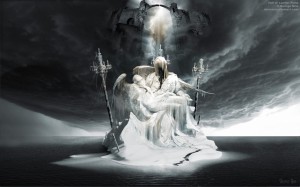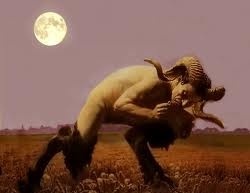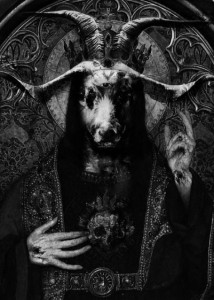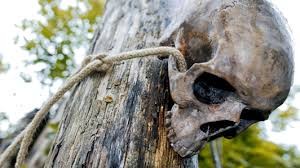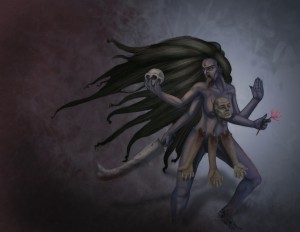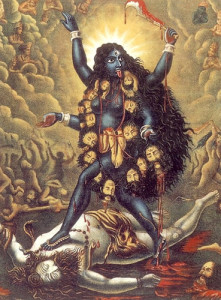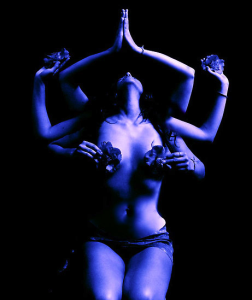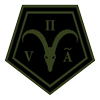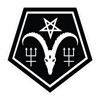Who Runs the Asylum? by Thomas LeRoy
Who runs the asylum?
Bent upon the edge,
Who scatters the dreams?
Left upon the ledge.
Who tastes the evil?
Ripe upon the tongue,
Who warns the weary,
Upon the broken rung.
Who sings the song?
As madness tempts the fools,
A step into the dark,
As phantoms break the rules.
Who’s voice is stifled?
As they scream in fear,
Who bleeds the most?
As you remove the spear.
Who scars the night?
A streak across the sky,
Who laughs the loudest,
On that day you die?
The Charge of the Horned God
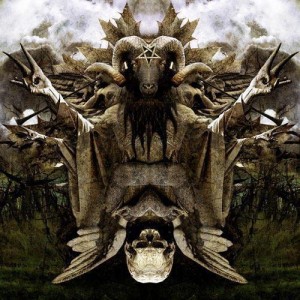
“Listen to the words of the Horned God,
Guardian of all things untamed, Lord of Shadows, Master of Darkness,
And keeper of the Gates of Death whose call all must answer:
“I am the fire within your heart, the yearning of your soul.
I am the Hunter of Knowledge,
The Seeker of Truth,
I stand in the darkness of light, who you have named Death,
I throw open wide the Gates of Hell,
And unleash my minions!
But first I beckon ye forth,
To come unto me,
And learn the secrets of Death and Peace,
For I am the Infernal Lord, the Devourer of the Weak!
Scourge and Flame, blade and blood,
These are my gifts unto thee.
I, Keeper of the Black Flame,
Whom you seek in the darkness bright,
I, who has been called Pan, Cernunnos, Dionysus, Shiva and Satan,
For behold!
You are my children and I your father.
For whomever seeks me know I am the master of the Pit,
The fury of the storm in your soul!
On swift night wings go forth,
Seek me with pride and selfishness,
Reason and logic,
But best to seek me with lust and strength,
For this is my path!
Hail the Horned God!
Hail Thyself!
Hail the Sect!”
The Litanies Of Satan by Charles Baudelaire
O you, the most knowing, and loveliest of Angels,
a god fate betrayed, deprived of praises,
O Satan, take pity on my long misery!
O, Prince of exile to whom wrong has been done, who, vanquished, always recovers more strongly,
O Satan, take pity on my long misery!
You who know everything, king of the Underworld,
the familiar healer of human distress,
O Satan, take pity on my long misery!
You who teach even lepers, accursed pariahs, through love itself the taste for Paradise,
O Satan, take pity on my long misery!
O you who on Death, your ancient true lover,
engendered Hope – that lunatic charmer!
O Satan, take pity on my long misery!
You who grant the condemned that calm, proud look
that damns a whole people crowding the scaffold,
O Satan, take pity on my long misery!
You who know in what corners of envious countries
a jealous God hid those stones that are precious,
O Satan, take pity on my long misery!
You whose clear eye knows the deep caches
where, buried, the race of metals slumbers,
O Satan, take pity on my long misery!
You whose huge hands hide the precipice,
from the sleepwalker on the sky-scraper’s cliff,
O Satan, take pity on my long misery!
You who make magically supple the bones
of the drunkard, out late, who’s trampled by horses,
O Satan, take pity on my long misery!
You who taught us to mix saltpetre with sulphur
to console the frail human being who suffers,
O Satan, take pity on my long misery!
You who set your mark, o subtle accomplice,
on the forehead of Croesus, the vile and pitiless,
O Satan, take pity on my long misery!
You who set in the hearts and eyes of young girls
the cult of the wound, adoration of rags,
O Satan, take pity on my long misery!
The exile’s staff, the light of invention,
confessor to those to be hanged, to conspirators,
O Satan, take pity on my long misery!
Father, adopting those whom God the Father
drove in dark anger from the earthly paradise,
O Satan, take pity on my long misery!
Hymn to Pan by Aleister Crowley
Thrill with lissome lust of the light,
O man! My man!
Come careering out of the night
Of Pan! Io Pan!
Io Pan! Io Pan! Come over the sea
From Sicily and from Arcady!
Roaming as Bacchus, with fauns and pards
And nymphs and satyrs for thy guards,
On a milk-white ass, come over the sea
To me, to me,
Come with Apollo in bridal dress
(Spheperdess and pythoness)
Come with Artemis, silken shod,
And wash thy white thigh, beautiful God,
In the moon, of the woods, on the marble mount,
The dimpled dawn of of the amber fount!
Dip the purple of passionate prayer
In the crimson shrine, the scarlet snare,
The soul that startles in eyes of blue
To watch thy wantoness weeping through
The tangled grove, the gnarled bole
Of the living tree that is spirit and soul
And body and brain -come over the sea,
(Io Pan ! Io Pan !)
Devil or god, to me, to me,
My man! my man!
Come with trumpets sounding shrill
Over the hill!
Come with drums low muttering
From the spring!
Come with flute and come with pipe!
Am I not ripe?
I, who wait and writhe and wrestle
With air that hath no boughs to nestle
My body, weary of empty clasp,
Strong as a lion, and sharp as an asp-
Come, O come!
I am numb
With the lonely lust of devildom.
Thrust the sword through the galling fetter,
All devourer, all begetter;
Give me the sign of the Open Eye
And the token erect of thorny thigh
And the word of madness and mystery,
O pan! Io Pan!
Io Pan! Io Pan! Pan Pan! Pan,
I am a man:
Do as thou wilt, as a great god can,
O Pan! Io Pan!
Io Pan! Io Pan Pan! I am awake
In the grip of the snake.
The eagle slashes with beak and claw;
The gods withdraw:
The great beasts come, Io Pan! I am borne
To death on the horn
Of the Unicorn.
I am Pan! Io Pan! Io Pan Pan! Pan!
I am thy mate, I am thy man,
Goat of thy flock, I am gold , I am god,
Flesh to thy bone, flower to thy rod.
With hoofs of steel I race on the rocks
Through solstice stubborn to equinox.
And I rave; and I rape and I rip and I rend
Everlasting, world without end.
Mannikin, maiden, maenad, man,
In the might of Pan.
Io Pan! Io Pan Pan! Pan! Io Pan!
Hymn to Satan by Giosue Carducci
To you, creation’s
mighty principle,
matter and spirit
reason and sense
Whilst the wine
sparkles in cups
like the soul
in the eye
Whilst earth and
sun exchange
their smiles and
words of love
And shudders
from their secret embrace run down
from the mountains, and
the plain throbs with new life
To you my daring
verses are unleashed,
you I invoke, O Satan
monarch of the feast.
Put aside your sprinkler,
priest, and your litanies!
No, priest, Satan
does not retreat!
Behold! Rust
erodes the mystic
sword of Michael
and the faithful
Archangel, deplumed,
drops into the void.
The thunderbolt lies frozen
in Jove’s hand
Like pale meteors,
spent worlds,
the angels drop
from the firmament
In unsleeping
matter,
king of phenomena,
monarch of form,
Satan alone lives.
He holds sway in
the tremulous flash
of some dark eye,
Or the eye which languidly
turns and resists,
or which, bright and moist,
provokes, insists.
He shines in the bright
blood of grapes,
by which transient
joy persists,
Which restores fleeting
life, keeps
grief at bay,
and inspires us with love
You breathe, O Satan
in my verses,
when from my heart explodes
a challenge to the god
Of wicked pontiffs,
bloody kings;
and like lightning you
shock men’s minds.
Sculpture, painting
and poetry
first lived for you, Ahriman,
Adonis and Astarte,
When Venus
Anadyomene
blessed the
clear Ionian skies
For you the trees of
Lebannon shook,
resurrected lover
of the holy Cyprian:
For you wild dances were done
and choruses swelled
for you virgins offered
their spotless love,
Amongst the perfumed
palms of Idumea
where the Cyprian
seas foam.
To what avail did
the barbarous Christian
fury of agape,
in obscene ritual,
With holy torch
burn down your temples,
scattering their
Greek statuary?
You, a refugee,
the mindful people
welcomed into their homes
amongst their household gods
Thereafter filling the throbbing
female heart
with your fervor
as both god and lover
You inspired the witch,
pallid from endless enquiry,
to succor
suffering nature
You, to the intent gaze
of the alchemist,
and to the skeptical eye
of the sorcerer,
You revealed bright
new heavens
beyond the confines
of the drowsy cloister.
Fleeing from material
things, where you reside,
the dreary monk took refuge
in the Theban desert.
To you O soul
with your sprig severed,
Satan is benign:
he gives you your Heloise.
You mortify yourself to no purpose,
in your rough sackcloth:
Satan still murmurs to you
lines from Maro and Flaccus
Amidst the dirge
and wailing of the Psalms;
and he brings to your side
the divine shapes,
Roseate amidst that
horrid black crowd,
of Lycoris
and Glycera
But other shapes
from a more glorious age
fitfully fill
the sleepless cell.
Satan, from pages
in Livy, conjures fervent
tribunes, consuls,
restless throngs;
And he thrusts you,
O monk, with your memories
of Italy’s proud past
upon the Capitol.
And you whom the raging
pyre could not destroy,
voices of destiny,
Wycliffe and Huss,
You lift to the winds
your waning cry:
‘The new age is dawning,
the time has come’.
And already mitres
and crowns tremble:
from the cloister
rebellion rumbles
Preaching defiance
in the voice of the
cassocked Girolamo
Savonarola
As Martin Luther
threw off his monkish robes,
so throw off your shackles,
O mind of man,
And crowned with flame,
shoot lightning and thunder;
Matter, arise;
Satan has won.
Both beautiful and awful
a monster is unleashed
it scours the oceans
is scours the land
Glittering and belching smoke
like a volcano,
it conquers the hills
it devours the plains.
It flies over chasms,
then burrows
into unknown caverns
along deepest paths;
To re-emerge, unconquerable
from shore to shore
it bellows out
like a whirlwind,
Like a whirlwind
it spews its breath:
‘It is Satan, you peoples,
Great Satan passes by’.
He passes by, bringing blessing
from place to place,
upon his unstoppable
chariot of fire
Hail, O Satan
O rebellion,
O you avenging force
of human reason!
Let holy incense
and prayers rise to you!
You have utterly vanquished
the Jehova of the Priests.
Druids: The Dark Holy Men of the Celts
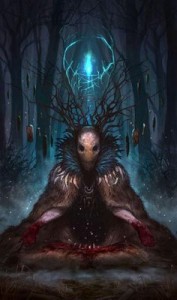
by Thomas LeRoy ~ Founder of The Sect of the Horned God
Most of what we know of the ancient Druids was written by the Greeks and Romans, enemies of the Celts. And what they have written of these “Men of the Oak” has not been flattering. Today’s Druids play at being the jovial nature lovers, marching around Stonehenge on the Solstices performing rituals created in the early 19th century. But were the Druids really happy tree-huggers, or did they have a darker side?
The Druids were the Celtic priests, philosophers, judges and soothsayers who convened with the gods, and divined the future. They were political advisers who had influence over the decisions of kings and chiefs. The Druids were extremely powerful in Celtic society, a society known for its beautiful art, mythology, warrior culture and head-hunting.
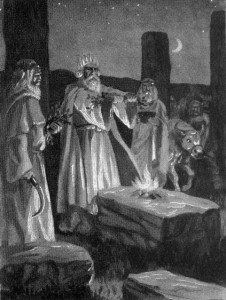
Roman texts accuse the Druids of performing human sacrifice. According to Caesar, the Druids believed that “The Gods delight in the slaughter of prisoners and criminals, and when the supply of captives runs short, they sacrifice even the innocent”. Tacitus claims the Druids “…deemed it a pious duty to cover their altars with the blood of captives and to consult their deities through human entrails.” Diodorus Siculus claims that the Druids, “… choose a person for death and stab him or her in the chest above the diaphragm. By the convulsion of the victim’s limbs and the spurting of blood, they foretell the future.”
We may be shocked at Celtic sacrifice and head-hunting, as were the Greeks and Romans, and wonder if such reports could have been exaggerated, seeking to portray the Celts as barbarians, thus giving Rome justification to conquer. But, in truth, the classical reports don’t even begin to compare with the gruesome evidence archaeologists have unearthed.
At Roquepertuse in southern France, a Celtic sanctuary from the third century B.C., yielded concrete evidence of severed heads used in rituals. A substantial Iron Age walled fort was in place there with a cultic shrine, dominated by decorative porticos with niches. Real and sculpted human heads were exhibited in these niches: the portico apparently constituted something of a gallery of heroes.
In Britain in the 1980’s, the bog-mummified body of a Druidic sacrifice “Lindow Man” came to light. Evidence showed that he was a person of high rank, perhaps even a Druid himself, killed about the time of the Roman invasions. Did the Druids do this to appease the gods so that they may aid them against the Romans?
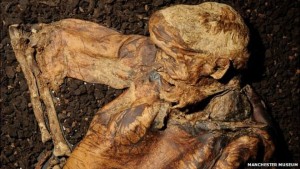
Then came the discovery in 2000 of 150 human skeletons, found in a cave in Alveston, England. Evidence showed that the Druids may have killed their victims in a single event. It’s possible that the Roman invasion itself was responsible for the escalation in the Druids’ ritualized slaughter, according to the researchers.
Now, is it fair to judge the Druids through the filter of the 21st century? No.
The Celts were a people of their time. A brutal age. But still, the modern Druids should not ignore the fact that true Druidism is soaked in blood.
Not Worthy of Freedom
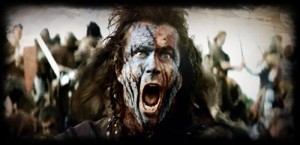
– By Dimitri, Instructor of the Order of Prometheus
Freedom. A buzzword frequently used to rally people behind a perceived oppressive cause. A buzzword used in different cultures as a token of pride and an asset as to “why” they’re better. Freedom invokes many philosophical discussions ranging to what it exactly is towards questioning its attainability and even asking if it truly exists.
Despite the many ideas and utopist scenarios of content it invokes did very few dare to question and entertain the idea if they are worthy of freedom [after all…we’re decent human beings and automatically assume we SHOULD BE entitled to it]. Even fewer people dare to question if they can handle it.
Freedom implies a decent knowledge of self. It implies reliability on the self. It demands taking up the own responsibility. It negates the possibility of a “US” vs “THEM” dichotomy and points the finger directly towards the self. Very few people can handle such a responsibility. As a social animal it almost becomes second nature to try and share responsibility with others in an effort to damage-control. It is almost second nature in excusing made faults on external factors like gods, faith, friends, enemies,… the proverbial “THEM (others)”.
Freedom places a huge mark behind the idea of self-sustainment and the ability to face your own choices. It comes as a little surplus to the idea of being free to choose and do whatever is desired. The main question is “Can you handle the judgement?” as freedom is something highly personal and not a shared asset in a culture, state or country. There’s only you and the always present and always numerous “them” who will not hesitate to judge and condone.
If there’s the inability to handle this responsibility than perhaps freedom isn’t something that should be upheld. The Satanist in popular (sub)culture is always seen as the adversarial force who questions and seeks answers through “conflict”. As a person who shuns and tries to break the shackles of religion and “cultural/social pressure”. But did it ever occur that despite the popular rallying cries those “bounds” and chains are perhaps self-imposed? That these chains are what you actually deserve, and willfully opted for, because there was the inability to deal with the responsibility and duty that freedom and liberty demand of the self?
The mind has always had the distinct trait of binding itself in one way or another. There’s always a good reason why it does so. Ask yourselves if you can handle the responsibilities that comes with free choice. There are always venomous snakes and spiders in the fertile green hills and plains of imagination.
Pleasure in Pain
By Dimitri
People dream of leaving their mark on history. To be the best in the field they believe to be most experienced on. To bring about a change. To stand out by having stepped up before the masses. Be it through study and devotion. Be it by seeking ways to stand out from the perceived mediocrity. Always failing to comprehend there’s no difference between the proverbial “them” and “us”. It is a futile attempt, and indeed trait, to be the bigger man as all (wo)men are righteous and bigger than the other in their own distinct ways. Mindspace can invoke quite the illusions as if they almost become tangible…
The mind, despite being a curious and fascinating thing in itself, is quite boring without the flesh. What would the mind be without the stimuli of the flesh? How would the mind possibly know what sexual ecstasy is without having perceived the pleasure of intimacy between highly sensitive spots. The rubbing of skin on skin and invoked rapid breathing of the increasing thrusting movements and the release of hormones due to extreme arousal.
How would the mind know what strength is if the flesh has never stretched itself or never experienced the impact of brute force. How does the mind know what technique is if it never learned to perform successions of movements in repetition? It does not know. It can only imagine but not perform.
The mind needs the flesh. Otherwise it is unable to make sense of itself. It needs carnal pleasure to know what ecstasy is. But what it learns best is pain. People can learn tradition through words. They only have they obey them without thinking twice. It’s carved and pre-set. Mindspace can do the necessary “illusions” (albeit with a bit of stimulation if needed) to imagine possible consequences. But all people learn, oh how they learn, through pain. Without it, many things would simply sound so un-impressive. There would simply be nothing to relate to.
But what sights it can invoke. Arousal. Education. Responsibility. Humidity. Nostalgia. This and much more. There’s always a bit of constraint to enjoy the pleasures the flesh can offer. But let it be known that the greatest suffering can lead to the greatest efforts. Rejoice! As it is the truest vector to know and recognize reality.
There’s a beauty in suffering.
It reminds to the fact you’re no better than the lowest beast.
Isn’t it exhilarating to know your greatest mentor?
And people want to leave their mark on the world.
How utterly pointless. Leaving a scar is such more worthwhile effort.
Pain will always be remembered. The bigger the atrocity, the better the memory.
Kali: The Dark Mother of the Left-Hand Path
“In the Orient, the gods do not stand as ultimate terms, ultimate ends, substantial beings, to be sought and regarded in and for themselves. They are more like metaphors, to serve as guides, pointing beyond themselves and leading one to an experience of one’s own identity with a mystery that transcends them.”
–Joseph Campbell
No image better represents the left-hand path than Kali. For at its roots, the left-hand path is the feminine path. Kali is the ferocious form of the Mother Goddess. She is represented with perhaps the most intense features among all the world’s deities. She has four arms, with a sword in one hand and the head of a demon in another. The other two hands bless all, and say, “Fear not!” She has two dead heads for her earrings, a string of skulls as necklace, and a girdle made of human arms as her clothing.
Kali’s form is replete with awesome symbolism. Her long, wild black hair, flowing freely, depicts her freedom from conformity. Her wide eyes, alert, ablaze with the fury of two molten pits, is an expression of her relentless intensity. A vertical third eye is in the middle of her forehead represents her omniscience. Kali’s black complexion symbolizes her all-embracing, transcendental nature, visualized as a vortex from which all creation emerges and to which it returns.; and her nudity portrays the primal aspects of Nature.
It is said Kali was born from the brow of the Goddess Durga during one of her battles with the evil forces. As the story goes, while in the heat of battle, Kali was so involved in the killing spree, drunk on the blood of her victims, that she got carried away and began destroying everything in sight. To stop her, Lord Shiva threw himself under her feet. Shocked at this sight, Kali stuck out her tongue in astonishment, and put an end to her homicidal rampage. Hence the common image of Kali shows her in her mêlée mood, standing with one foot on Shiva’s chest, with her enormous tongue sticking out.
As Kali danced upon Shiva, it evolved into a sexual act. She straddled him; she being on top, taking control. Shiva became the passive one. He satiated her desire by offering her sex in which she was in control. He was acted upon, for if Shiva had not given in to Kali, she would have destroyed the world.
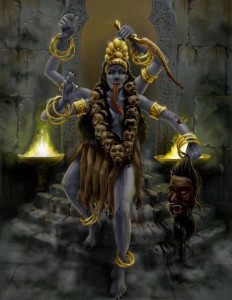
On the left-hand path it is necessary to enter the spontaneous chaos that is our true nature by breaking taboos, and shattering the chains of slave morality. Kali is there to help. She is the great liberator, representing the consuming aspects of reality, but burdened with the task of bringing about self-actualization. One does not worship her, but instead enacts with her divinity from a subjective perspective. But with Kali we risk madness when we let go of the familiar setting of our self-prescribed limitations. In this madness, Kali simultaneously creates and destroys, intoxicated with the paradox that death feeds on life, and life feeds on death — the eternal Wheel of Time. She is in the waning and waxing of the moon, the turning of the seasons, the shedding of the old self for the new, these are all part of her feminine rhythms. Her healing and empowering energy is not just for women, though, but for men as well. Embracing this dark manifestation of the anima shatters illusions and reveals that the repressed feminine aspects regarded as weak, irrational, chaotic, or emotional, are in truth, powerful tools to help lead one to self-deification.

